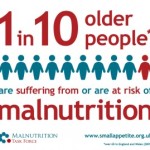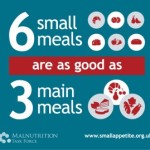 Malnutrition in the elderly is more common than you may think.
Malnutrition in the elderly is more common than you may think.
The Malnutrition Task Force is an independent group of experts across health, social care and local government united to address avoidable and preventable malnutrition in older people.
Established in 2012, they share their expertise and work with partners in hospitals, care homes, local authorities and private and voluntary organisations.
Malnutrition, here characterised by low body weight and weight loss, is a major cause and consequence of poor health and older people are particularly vulnerable.
Over 3 million people across the UK are either malnourished or at risk of malnourishment with over 1 millionover the age of 65 and the vast majority of people are living in the community. The cost of malnutrition is estimated to be in the region of billions of pounds a year.

The Malnutrition task force are currently running a small meals campaign, suggesting that 6 small higher protein and in some cases sugar are better than 3 larger ones. Does it really matter if at 90 your diet isn’t as healthy as it would have been 40 years ago when what you need now is calories?.
They have some really useful guides available to read such as this “Are you eating enough” one available here. Their guides are also available as hard copies by emailing them here enquiries@malnutritiontaskforce.org.uk.
The Malnutrition Task force also have a blog which you can access here with further ideas and information to help you maintain good nutrition for the elderly people in your life.

I agree Sally,many men of that generation never needed to know how to cook as their wives did it all. It was the way life was for them.It does come as a shock when they become a carer or are left alone.
They have some effective ideas and raise very important issues.
We just talked about the issue of male carers. Gentlemen who are trying so hard to care for their wives. When you think of it, this will probably be the last generation coping with limited skills because of the way they were brought up.
We meet lot of people in this situation and it is an honour to help.